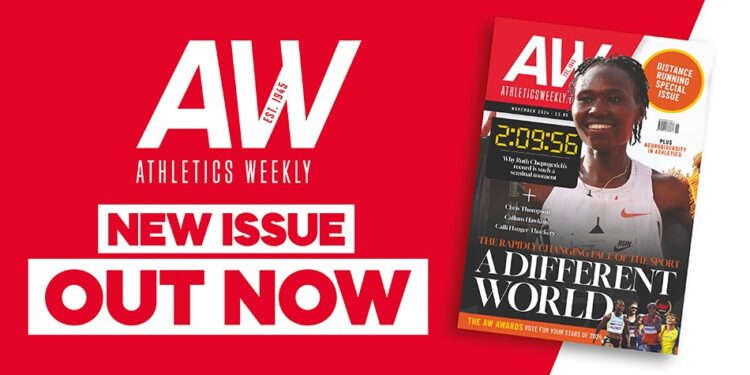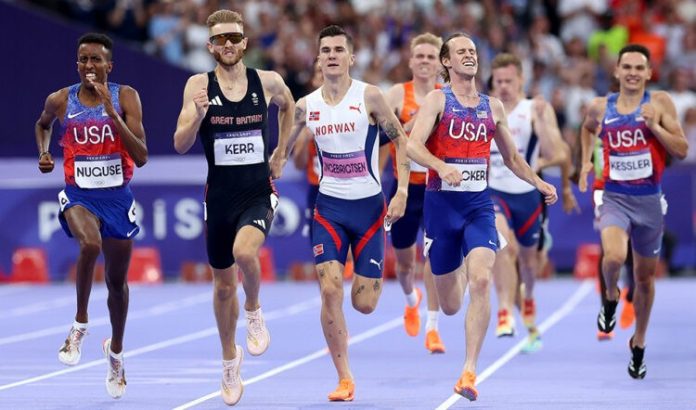
Olympian and broadcaster Tim Hutchings says we shouldn’t underestimate how spoiled athletics fans are for choice right now.
I’m afraid most of us in the sport of athletics are underestimating how much of it is broadcast, either on terrestrial and satellite television or broadcast over the Internet. We’re lucky to have the “No. 1 Olympic sport” in our living rooms almost year-round, and on an incredibly regular basis.
While athletics was never under threat in this case, the recently announced and revised schedule for the 2026 Commonwealth Games should serve as a sobering reminder that no sport is immune to the knife of cost-cutting.
So we’re lucky to have had such a feast to devour and I’m delighted with the wide range and scale of athletics events that have been staged in the stadiums and on the roads over the past year.
Over the past 35 years, I’ve been in the privileged position of being a part of it all from my position in the commentary box, and 2024 has been one of the most enjoyable years behind the mic.
At the beginning of June we had the European Championships in Rome and of course the Olympics eight weeks later, while 15 Diamond League matches were also sewn up for the summer as well as dozens of World Athletics Continental Tour matches.
Our fabulous team of British athletes have done us proud this year and, as I write, Keeley Hodgkinson looks to be at least favorite to be BBC Sports Personality of the Year. Our medal haul in Rome and Paris, although many were relay medals, was amazing and more than enough to justify the sport expecting good television coverage, good funding and good recruitment at club level in the near future.

Kelly Hodgkinson (Getty)
Indeed, it is a testament to the way our sport is built in the UK that athletics has delivered the best value for money in central funding per medal won in Paris. In contrast, the striking absence of sports sponsors on the British scene remains one of the great mysteries of the current era. It both puzzles and infuriates me.
But back to the day’s work. Many of you reading this would no doubt love to try your hand at TV commentary. I mean, how hard can it be? You show up, describe what you see in a few nuances, and it’s a case of job done.
Of course, the phrase “armchair expert” came about for a reason, and it’s all too easy to pass judgment not only on athletes trying their best, but also on commentators. If you miss something, you are wrong. If you know someone wrong, you are wrong. If you slip on a split, drop, field position, or make a mistake on a clip thrown at you, live or off tape, you make a mistake, and don’t those “experts” let you know?
That said, like any challenging task, it’s satisfying to get a project (racing title) right, and just as frustrating to get it wrong. With many jobs, it’s all about preparation, but no matter how prepared you may be, live sports have a habit of throwing goggles at you.
I knew co-workers beat them up for bad racing, but what we do know is that 99 percent of the listeners wouldn’t even notice, and the few who did were mostly both sympathetic to the small mistake and too. too busy enjoying the rest of the coverage to worry about any public criticism.
Fortunately, most shows do well, viewers are excited, which I think is the most important element of our job, and they look forward to the next best match.

Olympic 1500m final (River)
Speaking of which, the men’s 1500m final in Paris was my ‘Race of the Games’, a truly fascinating battle, decided by such fine margins. Jakob, you know, the one who told me after the Games that he knew he was going to blow it when he saw the first 400m run under 55 seconds and that after 1000m his legs were “absolutely dead” running straight. His racing strategy is hugely risky but highly rewarding when it goes right, and I admire him immensely for that “catch me if you can” attitude. While he’s involved, no major final will be won with a 51-second last lap again, and others are constantly trying to be as strong as he is. He has changed the entire world of middle distance racing.
Britain’s success in Paris was solid, but the disappointment could have been much more. Can you imagine if Matthew Hudson-Smith hadn’t been caught by Quincy Hall, or if Josh Carey’s 1500m gold had dangled after passing Jacob? Neither Matt nor Josh put a foot forward in their race, but were simply beaten by an external force over which they had no influence.
In athletics, as Discus Queen and two-time Olympic champion Valarie Allman told me recently, you just have to accept that on any given day, another person can achieve something incredibly special that you have zero control over, even when you yourself did you do everything right? Losing in those circumstances is not a shame at all.
But the race of the summer, for me, didn’t happen at the games. it was Jacob’s 3000m world record in the Silesian Diamond League. That’s because, like his two-mile world record at the Paris Diamond League last year, he didn’t just break the best mark ever, he obliterated it completely.

Jakob Ingebrigtsen (River)
We live in a privileged time in our sport where the consummate pros run races that make me want to get on the mic time and time again. Officiating is often an “act” as you must gauge your volume and excitement level by going “through the swings” to achieve top speed as the athletes approach the finish line.
But again and again this summer I found myself just calling races out of instinct rather than design, and that was a great privilege and a real pleasure, too many times to tell.
The coming year holds plenty of intrigue as Michael Johnson’s four-match Grand Slam Track Series is the only track event coming to the arena. How will it be viewed? I’m sure the Diamond League will also feature fabulous performances from the Caps again, but this time it will end before the World Cup in Tokyo in September. There will be nothing after that, no track meets at all. Now that would be weird.
Fortunately, familiarity with intense competition never leads to boredom or apathy. Will Keeley threaten the 800m world record as many predict? Will Jacob get that elusive world 1500m title? Can Noah Lyles after winning the 100m Olympic title but losing the 200m (albeit with Covid)? Finally, let’s remember how lucky we are that whether your thing runs, jumps or throws, you’ll have plenty of opportunities to see it next year, indoors and outdoors. These are special times and we should celebrate them.

» This article first appeared in the November issue of AW magazine. Subscribe to AW Magazine herecheck out our new podcast! here or subscribe to our digital archive of back issues from 1945 to the present day here
The post Why is athletics compulsive viewing right now? appeared first AW:.


